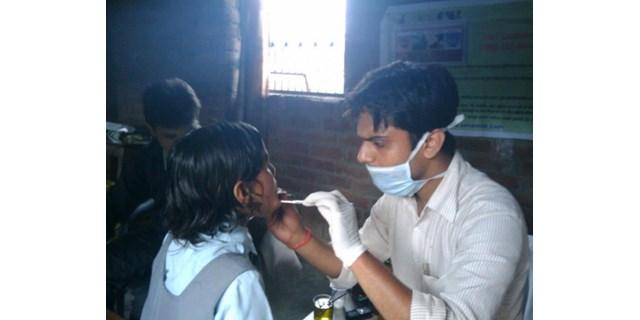
At just Rs. 100 per subscriber, Sevamob is transforming on the ground primary healthcare service in the far-flung areas of North India through its mobile clinics, doctors at the doorstep and unmatched service. Shelley Saxena, Founder and CEO at Sevamob tells us about their subscription-based primary health care and financial assistance service delivered to low-income groups in Lucknow.
Genesis: cloud services
The story of Sevamob is a straightforward one, admits founder Shelley Saxena. Going back a few years to when the seed of the idea was sown, Shelley co-founded Saasmob, an Atlanta based company that built SaaS solutions for a variety of enterprise requirements.
“Through Saasmob, we were providing advice to farmers in the US about the type of crops to grow and how to treat and diagnose crop related diseases. This was done in partnership with the University of Georgia and University of Tennessee,” says Shelley. At the time there was a strong motivation to replicate this advisory service in India, but it was yet to be determined the form this service would take. It was also clear that there existed an inherent technology literacy challenge in India, with the target segment not owning the requisite data-capable smartphones. Additionally there was a heavy dependence on teams of people on the ground to make any service viable and useful to an end-consumer, particularly in semi-urban and rural areas.
A survey in the semi-rural areas of Uttar Pradesh, namely Kakori (in the mango belt), Mohanlalganj (populations involved in dairy and milk production) and low income areas in Lucknow city revealed that there was a strong need for primary health care services and insurance. The survey was detailed enough to capture specifics around what categories of medical attention were required such as gynaecology and pediatrics. Sevamob (formerly known as Smart Gaon) was born.
Central Idea and Solution: healthcare at your doorstep
Sevamob provides primary healthcare and insurance to low-income consumers in regions of Lucknow, Uttar Pradesh. The model has also been replicated in Liberia, Africa through a franchise model. Healthcare is offered as a bundle of services – primary, preventive and hospitalization benefits for just Rs.100 to 150/month. Sevamob also provides healthcare to students in schools and employees in factories and services organizations. Group subscriptions help Sevamob offer a very subsidized rate for this bundle of services.
Preventive care and prescriptions are delivered on-premise by mobile clinics with the help of mobile technology. For advanced care, the teams are supported by back-office specialists, a 24×7 call centre and a network of 3rd party service providers like hospitals, clinics, pathologists and insurance companies. Since launching in December 2011, Sevamob now has over 3000 subscribers paying for and actively using this service in Lucknow, Kakori, Mohanlalganj and Barabanki.
Their social impact includes promoting health and welfare among children; higher productivity and incomes through improved “up-time” of workers and a safety net for emergencies in infrastructure challenged regions. Subscribers that require more advanced or specialist care and tests also enjoy cash-back benefits and purchase medicines from in-network pharmacies. In the case of hospitalization in network hospitals, subscribers can get up to Rs.50,000 cash-back for medical expenses. Sevamob has made $11,000 (USD) in 2012-13.
Reality Check: gaining trust and leveraging mobile
Shelley recalls Sevamob’s first large obstacle, “There is a huge challenge in delivering any quality service particularly to low-income or semi-educated groups that involves gaining the trust of the community. Service companies roll into semi-urban and rural areas with big promises, taking their money but never delivering on the service. This left behind a challenging and skeptical environment for new players coming in.” Sevamob has overcome the trust issue by entering communities through known and trusted resellers. The reseller has existing relationships that may be leveraged for introductions and payment collections. Once the first service is delivered renewals just keep coming in and the trust is established. Renewals have consistently remained over 80%, proof that this technique works.
In geographies where no skilled doctor wants to practice in public or private healthcare centres, Sevamob leverages mobile healthcare. Where the cost of setting a physical centre in these areas is extremely capital intensive, the enterprise uses its mobile clinics that can travel and service larger areas and communities at a better cost.
Secret Sauce
Two things have worked wonders for Sevamob: Quality and consistency of service like none other in the vicinity. With standardized protocols for all services and medical records, a scalable mobile clinic system and a network of healthcare providers and assistance, their ability to address a host of primary, preventive and accident related healthcare is not easily matched in the hinterlands of Lucknow. Additionally, Shelley says that the entire team along with all third party providers in the network, maintain a fantastic synergy. Each member has internalized the value of delivering this quality service to these low-income communities. Sevamob has also identified a revenue model that works best for them. With three distinct streams – subscription fees, a referral fee for third party service and a license fee for replicating the technology in other regions – Sevamob is looking to make scalable and measurable impact in the way primary healthcare is delivered to low-income groups. Additionally Sevamob envisions running very targeted campaigns for interested parties among their subscriber base, ensuring full privacy and data protection, but monetizing the wealth of information they have on their target audience.
Future Plans
“Over the next 12 months, we will expand coverage from 2 districts to 5 districts in UP. We also plan to expand coverage to additional geographies through licensees. We want to develop mobile apps to make it easy for people to sponsor healthcare for kids in orphanage and elderly people in old age homes,” says Shelley.
